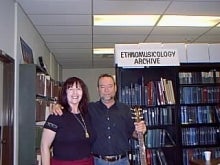Highlights from the Ethnomusicology Archive - John Williamson

One of the many wonderful things about working in the Ethnomusicology Archive is the people that you have the opportunity to meet... students, scholars, researchers, musicians...
One of my fondest memories is that of iconic Australian folk singer John Williamson visiting the Archive in February 2004. (Professor Anthony Seeger organized the visit.)
Maureen with legendary Australian singer, John Williamson
Williamson is a sixth-generation Australian who has been performing for over 40 years. He has sold over 4 million recordings and received numerous awards. He was inducted into the Australian Recording Industry Association (ARIA) Hall of Fame in 2010. You can learn more about him on his website.
During his visit, he not only sang, but he gifted the Archive with a variety of his recordings (both audio and visual) and his two songbooks, True Blue and True Blue Two. You can search the Archive's catalog to find his recordings.
Many of you might recognize Williamson from his performance at the opening ceremonies of the Sydney 2000 Olympic Games or perhaps his singing at Steve Irwin's Memorial Service.
A grand total of six of us in the Archive were gifted with an hour-plus long private performance by Williamson. He sang, accompanied by his guitar, and told stories. I hate to resort to hyperbole, but it really was magical. I won't recount the entire playlist, but I wanted to highlight some songs that really stuck with me.
"A Flag of Our Own" was actually banned in Australia at one point in time. (And anyone who has been in my office has seen the True Blue Aussie flag sticker given to me by Williamson.)
"Raining on the Rock" (the rock is Uluru, of course) is performed in this video with Warren H. Williams, an Arrernte man from Hermannsburg in central Australia. Australian Screen (Australia’s audiovisual heritage online) has a wonderful interview with Williams, "Warren H Williams, the stories, the songs."
"Rip Rip Wood Chip" voices Williamson's long-standing efforts to conserve Australia's environment. As he said, "you've got to fight for what you believe in."
Lest anyone think it was all seriousness, I think "Boogie with my Baby" needs no introduction or explanation.
And the last song I will mention is "Waltzing Matilda," which, in all honesty, I never realized was a protest song until Williamson. If you want to know more about "Waltzing Matilda," go to Australia's National Film and Sound Archive, Waltzing Matilda section.
To learn a bit more about John Williamson, listen to an interview with Williamson on National Radio, The Songlines Conversations, or read the transcript.





